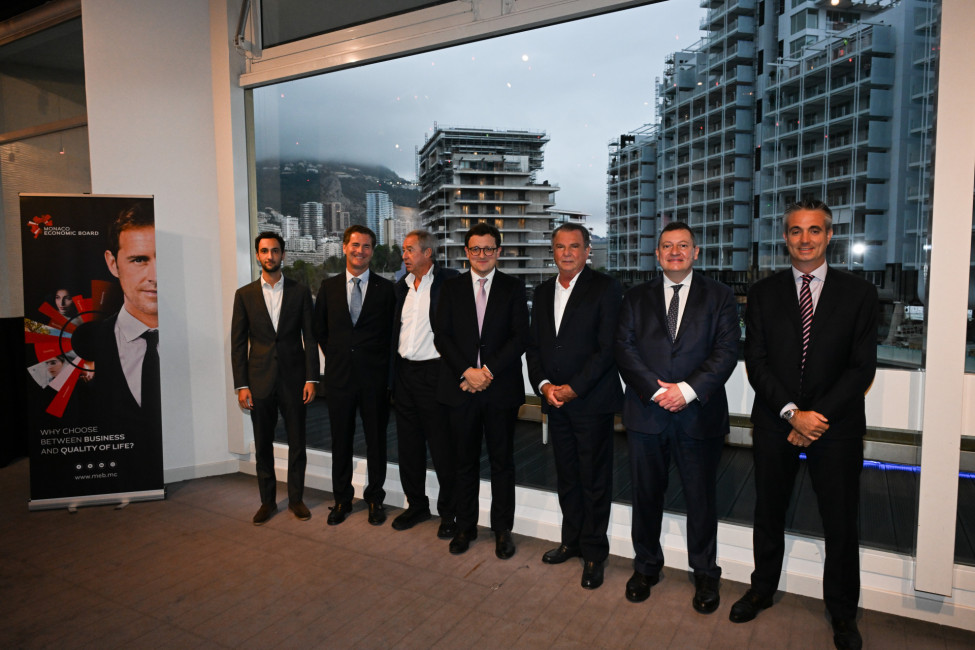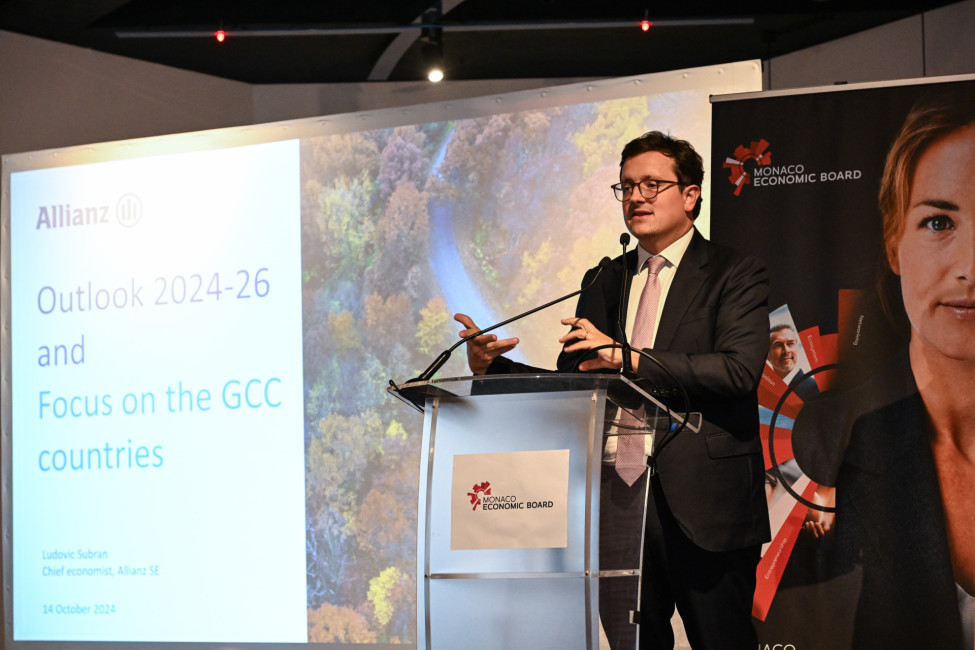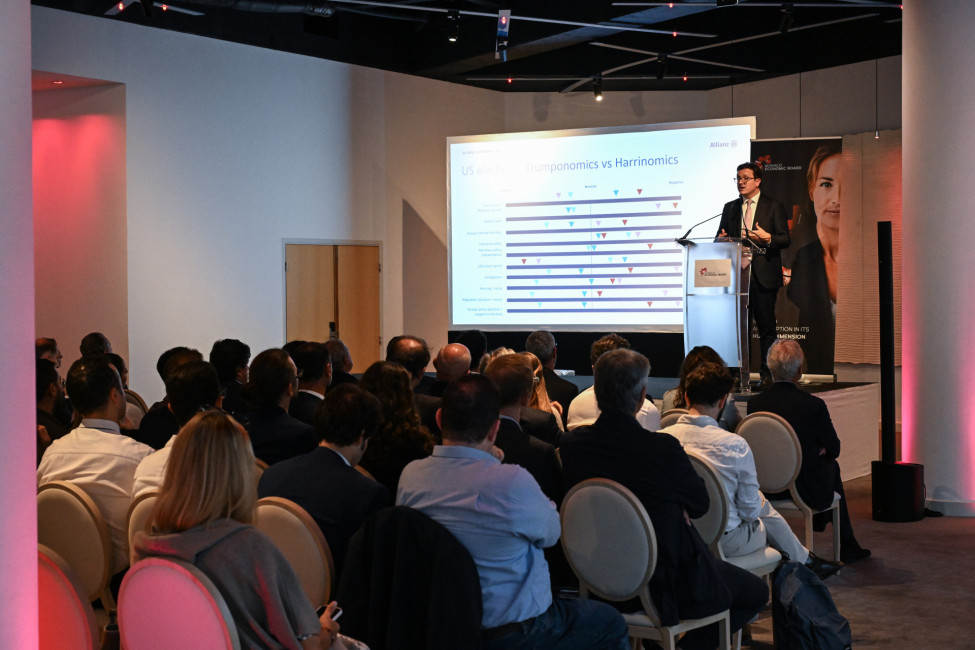Ludovic Subran deciphers the evolution of the global economy and the diversification choices of the Gulf States
On Monday, 14 October, at the Fairmont Monte-Carlo, the Monaco Economic Board, in partnership with Monaco Asset Management and the Jeune Chambre Economique de Monaco, organised a conference given by Ludovic Subran, Chief Economist of the Allianz Group, on the theme of "The Gulf States: from oil to knowledge". A region with great potential that the MEB wishes to continue exploring.
While the primary aim of this conference was to enlighten MEB members on the issues and potential of the Gulf States, and in particular those of the Arabian Peninsula, it would have been a shame not to hear a broader analysis of the global macroeconomic situation from a specialist of the calibre of Ludovic Subran, a regular contributor to the MEB for over 10 years and an outstanding speaker and teacher.
Allianz Group's chief economist introduced his presentation with a rather wait-and-see view of the state of the world: "We've managed to kill inflation, so there's growth, and that's all worked out rather well, but what happens next depends on 5 November" (in other words, the particularly uncertain American elections). For Ludovic Subran, the FED will be unable to continue cutting rates if Donald Trump is elected, which could trigger a return to inflation (customs barriers, anti-immigration policies that drive up wages, etc.) and, in the medium term, could lead to a new crisis, particularly in the property sector. In short, the soft landing of the global economy forecast 2025 would be out of the question. The election of Democrat Kamala Harris would be less destabilising but not necessarily much more favourable for Europe, as Joe Biden's Inflation Reduction Act has shown.
The economist then examined the situation in the world's other major economies. While Germany and Japan remain in recession, in France "austerity is coming, folks", which could lead to a downturn there too. Plagued by chronic deflation, China has unleashed a powerful domestic stimulus that promises to be significant, "good news for exporters". Italy, for example, has become the world's 4th largest industrial exporter, with a primary surplus on its budget. However, investment is insufficient throughout Europe, mainly due to flagging confidence.
Concerning the theme of the day, growth forecasts for the GCC* countries are encouraging (+4% in 2025, +4.2% in 2026) despite a fall in oil prices but driven by increased production. This situation will enable these countries to continue transforming towards a more diversified economy. Ludovic Subran summarises this transformation: "First, there were the petrodollars, which mainly benefited the Americans who helped build the infrastructure. Then came the first diversification, particularly in trade and real estate, with the rise of Dubai. Then a new phase saw the development of investments abroad with the help of sovereign wealth funds". Initially in real estate, but increasingly in new technologies, leading to the development of highly ambitious projects in their country, such as the futuristic city of Neom. "We know that not everything is going to work straight away, but they have time on their side," says Ludovic Subran. So even if in the energy transition sector "we still see a lot of greenwashing, but little by little they're getting there". With their sights set on the ability to export services, taking inspiration from models such as Singapore. This movement goes hand in hand with a generational shift in attitudes and the emergence of a middle class that challenges governments' social approach.
From a monetary point of view, these countries remain linked to the dollar. Still, in the medium term, "this is not tenable" because these countries are particularly attentive to inflation, which creates distortions in the FED's monetary policy. You end up with a situation where the richest country in the world is in recession because of US interest rates! The economist's advice in the face of this situation: "If you are an investor, do everything you can to work in euros."
Finally, Ludovic Subran looked at the new India-Middle East-Europe economic corridor, an infrastructure that aims to become an alternative to China's New Silk Road and the Suez Canal. This corridor represents another area of opportunity for the region.
These are just some opportunities the MEB will endeavour to pass on to companies in the Principality over the coming months.
Photo credits: MEB / P.H. Sébastien Darrasse

Ludovic Subran surrounded by the directors of MEB (on the right), Michel Dotta, Chairman, Guillaume Rose, Executive Managing Director, Justin Highman, Deputy Managing Director; and the directors of the sponsors (on the left), Monaco Asset Management with Gian Luca Braggiotti, Managing Chairman and Anthony Stent Torriani, Managing Director and JCE Monaco with Clément Maréchal, Chairman


